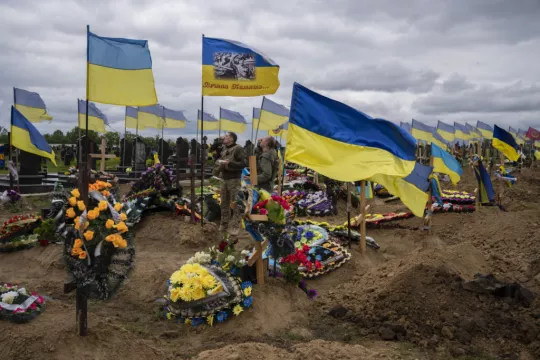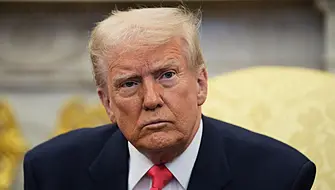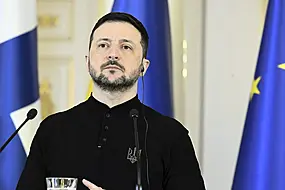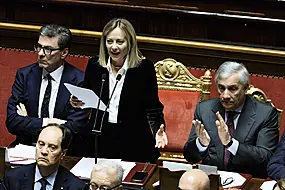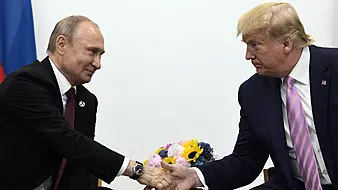Russian forces are bombarding a key city in eastern Ukraine with artillery and missiles in an attempt to take more of the Donbas region.
Sievierodonetsk is the main city under Ukrainian control in Luhansk province, which together with Donetsk province make up the Donbas.
Luhansk’s governor, Serhii Haidai, said on Sunday that the Russians were “simply intentionally trying to destroy the city… engaging in a scorched-earth approach”.
He said the Russians had occupied several towns and cities in Luhansk after indiscriminate, 24-hour shelling, adding Moscow was concentrating forces and weaponry there, bringing in forces from Kharkiv to the northwest, Mariupol to the south, and from inside Russia.

The Ukrainian military said Russian forces had mounted an unsuccessful attack on Oleksandrivka, a village outside of the city.
While Russian and Ukrainian forces battled along a 551-kilometre wedge of Ukraine’s eastern industrial heartland, Poland’s president travelled to Kyiv on Sunday to support Ukraine’s European Union aspirations, becoming the first foreign leader to address the Ukrainian parliament since the start of the war.
President Andrzej Duda received a standing ovation when he thanked the lawmakers for letting him speak where “the heart of a free, independent and democratic Ukraine beats”. Mr Duda said Ukraine need not submit to conditions given by Russian President Vladimir Putin.
“Unfortunately, in Europe there have also been disturbing voices in recent times demanding that Ukraine yield to Putin’s demands,” he said.
“I want to say clearly: Only Ukraine has the right to decide about its future. Only Ukraine has the right to decide for itself.”
It was Mr Duda’s second visit to Kyiv since April. Poland has become an important ally of Ukraine, welcoming millions of Ukrainian refugees and becoming a gateway for Western humanitarian aid and weapons.
It is also a transit point for some foreign fighters who have volunteered to fight the Russian forces.
Ukrainian President Volodymyr Zelenskiy called the visit “a historic opportunity not to lose such strong relations, built through blood, through Russian aggression”.
“All this not to lose our state, not to lose our people.”
Mr Duda credited the US and president Joe Biden for unifying the West in supporting Ukraine and imposing sanctions against Moscow.

Poland is ramping up efforts to win over EU members who are more hesitant about accepting Ukraine into the bloc. Mr Zelenskiy has urged the 27-member EU to expedite his country’s request to join, and it is to be discussed at a Brussels summit in late June.
France’s European Affairs minister Clement Beaune on Sunday told Radio J it would be a “long time” before Ukraine gains EU membership, perhaps up to two decades.
“We have to be honest,” he said. “If you say Ukraine is going to join the EU in six months, or a year or two, you’re lying.”
On the battlefield, grinding, town-by-town fighting continued as Russian troops try to expand the territory that Moscow-backed separatists have held since 2014 in the Donbas.
To bolster its defences, Ukraine’s parliament voted on Sunday to extend martial law and mobilise the armed forces for a third time, until August 23rd.
Ukrainian officials have said little since the war began about the extent of their country’s casualties, but Mr Zelenskiy said at a news conference on Sunday that 50 to 100 Ukrainian fighters were being killed, apparently each day, in the east.
In a general staff morning report, Russia said it was also preparing to resume its offensive on Slovyansk, a city in Donetsk province that saw fierce fighting last month after Moscow’s troops backed away from Kyiv.
The conflict was not confined to Ukraine’s east. Powerful explosions were heard early on Monday, for example, in Korosten, about 160 kilometres west of Kyiv, the town’s deputy mayor said.

It was the third straight day of apparent attacks in the Zhytomyr District, Ukrainian news agencies reported.
In Enerhodar, a Russian-held city 281 kilometres northwest of Mariupol, an explosion on Sunday injured the Moscow-appointed mayor at his residence, Ukrainian and Russian news agencies reported.
Ukraine’s Unian news agency said a bomb planted by “local partisans” wounded 48-year-old Andrei Shevchuk, whose lives near the Zaporizhzhia Nuclear Power Plant, Europe’s largest.
On Monday, a Ukrainian court was expected to reach a verdict for a Russian soldier who was the first to go on trial for an alleged war crime.
The 21-year-old sergeant, who has admitted to shooting a Ukrainian man in the head in a village in the north-eastern Sumy region on February 28, could get life in prison if convicted.
Ukrainian prosecutor general Iryna Venediktova has said her office was prosecuting war crimes cases against 41 Russian soldiers for offenses that included bombing civilian infrastructure, killing civilians, rape and looting.
